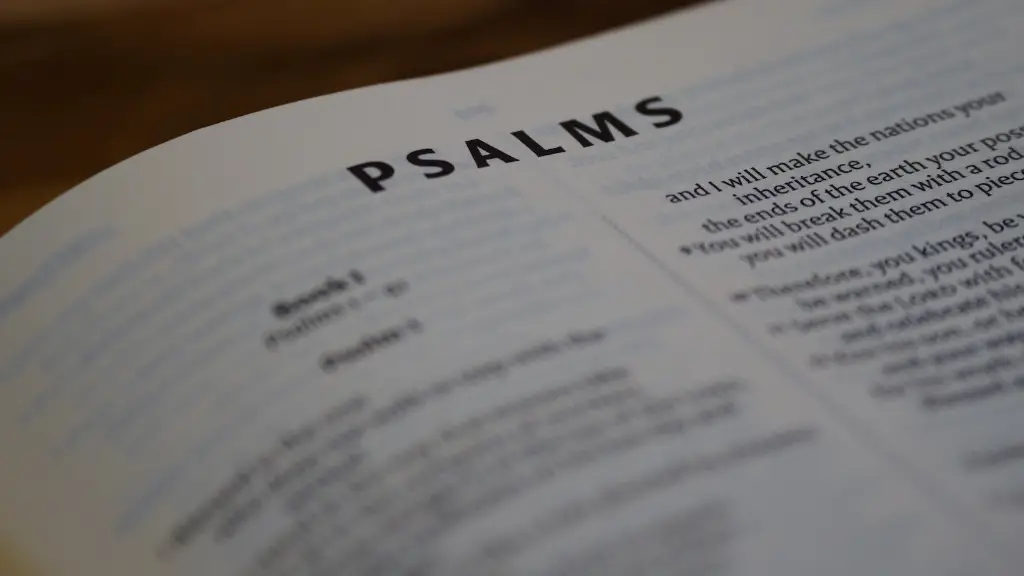What Is Piety In The Bible
The Bible is home to many concepts of piety and righteousness that have been influential in religious and ethical traditions around the world. At its core, piety is both a religious and personal practice of reverence for a higher power, with an emphasis on obligation or duty. Throughout the Bible and other religious texts, different terms are used to refer to piety, and these terms offer varied means to express the notion from different perspectives.
Piety has been seen, as far back as in ancient Egyptian times, as a means of gaining favor from a higher power by showing reverence and respect for it. In biblical times, it was seen as an act of being obedient to the laws of God, and as an act of thanks or gratitude for the blessings given to them. The Bible makes clear that it is possible to show piety by behavior, such as honoring one’s parents, avoiding the practices of idolatry and witchcraft, keeping of promises, and showing charity to those in need.
Within the Bible, piety is often seen as a virtue and action closely tied to righteousness and justice. It is seen as a quality that effects one’s spiritual and moral life, and can be used to describe devotion to God. Another way in which piety is seen in the Bible is as an attribute of faithfulness, showing loyalty to God by staying away from temptations and bad behavior. Piety is often tied to the idea of mercy and forgiveness, as demonstrated in the parable of the Prodigal Son: the father showing mercy and restoring his son’s relationship. The idea of piety in the Bible can also be found in other faiths, with aspects of it having appeared in Islamic and Jewish traditions.
The Bible does not try to define a set definition for what constitutes piety, instead it leaves it up to people to come to terms with their own personal interpretation. Piety is not meant to be understood as a rule book, as such; it is more a way of life and an attitude. One of the main messages of the Bible is that piety can be expressed in different ways, and its importance is made clear in many of Jesus’s parables. In the Sermon on the Mount, Jesus highlights the importance of not just being pious outwardly, but to lead a life consistent with one’s values.
It is also clear from the Bible that real piety is about living one’s life for God and for others rather than for just one’s own interests. It is about following God’s commandments and leading a life in accordance with the laws of God. This is not necessarily an easy task, however, as the Bible shows that it can take considerable effort to be able to achieve a truly pious life. Through the Bible, we can learn that there are times when we need to walk away from temptation and live a righteous life. Piety, as seen in the Bible, is not a simple list of do’s and don’ts, but an attitude that should be embraced and embraced no matter the difficulties it can bring.
Q. What Are Some Examples Of Piety?
There are many examples of pious behavior seen in the Bible. Examples of this include being kind to the needy, honoring one’s parents, avoiding the worship of false gods, keeping promises to one another, and being faithful to God. One of the most important examples of piety is seen in Jesus’s life. He set an example for all those who followed him, showing that piety is not just about keeping God’s law but also about showing love, mercy, and compassion toward others.
The Prophet Muhammad is another example of someone who embraced the concept of piety. He is shown in the Quran to practice and preach for piety, primarily in the form of worship, submission to God, and charitable acts. The Islamic faith also emphasizes the importance of piety, as it is seen as an essential element of the five pillars of Islam. In the Jewish faith, Passover is considered to be a key time of piety, with the message of the prophet Isaiah emphasizing the importance of being righteous, loving justice, and walking humbly with one’s God.
Q. What Is The Role Of Piety In Christianity?
In Christianity, piety is seen as an important means of expressing one’s devotion to God. It is considered an important part of self-discipline and a way in which to further separate oneself from the sinful part of life. Piety is seen as an important part of following Jesus Christ, and is seen as an essential part of faith experience. Piety is also seen in Christianity as a necessary part of self-reflection and conversion. Lastly, piety is seen in Christianity as a means of living a meaningful life by selflessly helping others and bettering the lives of others.
Piety is an important part of Christianity, with many of Jesus’s parables today extending the importance and how it can be expressed through charity and acts of kindness. Catholics, for example, are taught to practice the spiritual works of mercy, which include things such as feeding the hungry, clothing the naked, and visiting those in prison. Piety is also seen as a necessary part of expressing love for one’s fellow man, and for living according to the Ten Commandments.
Q. How Should Piety Be Practiced?
The Bible does not outline a single way piety should be practiced. Instead, it encourages individuals to choose a pious lifestyle that fits their own individual beliefs. To properly practice piety, it is important to consider what the Bible has to say about leading a righteous life. Bible verses, such as those in the Book of Proverbs, provide practical guidance on living a godly life, and can help to shape our understanding of proper piety.
The Bible repeatedly emphasizes that true piety comes from within, and can only be practiced faithfully when the one being pious practices with a humble heart and sincere devotion to God. It is also important to remember that true piety is not just about following the ideas of a religion or creed; it is about living a moral and principled life in line with one’s faith and beliefs. It requires one to be constantly mindful of the need to be obedient to God, and to act with love, mercy, and justice toward others.
Q. How Has Piety Changed In Modern Times?
In modern times, piety is a term that has largely been re-defined and adapted to reflect a more progressive understanding of religion and spirituality. Rather than being used as an oppressive term associated with following a certain set of laws and rules, piety is seen more of as an attitude and way of life that enables one to be their best selves and express their faith in a meaningful and authentic way. Today, piety is seen more as a source of liberation rather than submission and enslavement.
In modern society, piety is seen as more of an internal spiritual journey and practice that encourages inner growth and balance between the body, mind and spirit. Piety in modern times is seen as an important foundation for moral behavior, and it is seen as an important aspect of living in tune with nature and feeling an interconnectedness with all living things. Piety encourages one to be responsible and mindful of the choices they make and their effect on others.
Piety in modern times has been re-defined to emphasize its importance as an internal journey to find and live in line with God’s will. It is no longer seen as an external practice of religious rules and regulations, but instead is embraced as an intimate spiritual experience that allows individuals to more fully experience and express their faith. Piety is seen as a way to build a deeper relationship with God and to make meaningful connections with those around you.
Q. What Is The Purpose Of Piety?
The purpose of piety, as seen in the Bible, is to help individuals stay on the path of righteousness and to ensure that they remain in good standing with God. The Bible teaches us that true piety comes from faith and a sincere commitment to loving God, and it encourages us to be devoted to living a faithful and ethical life. Piety helps one to stay focused on their faith, which allows them to find greater meaning and joy in their lives. Piety has the ability to unite individuals from all walks of life, and it is seen as one of the surest paths to a meaningful, godly life.
At its core, the purpose of piety, as seen in the Bible, is to stay as close to God as possible and to live in line with His will. Jesus sets an example that, no matter what we are going through in life, if we remain devoted to God and embrace the spirit of piety we can live a life rich in faith, love, mercy, and justice. The Bible teaches us that by embracing piety and striving to live lives of righteousness, we can become better versions of ourselves and thereby bring greater peace and joy to the world around us.





I love the fact that every person tha writes about PIETY refersto the TORAH and its Commandments , which is not easily accepted by many believers. Thanks for this article